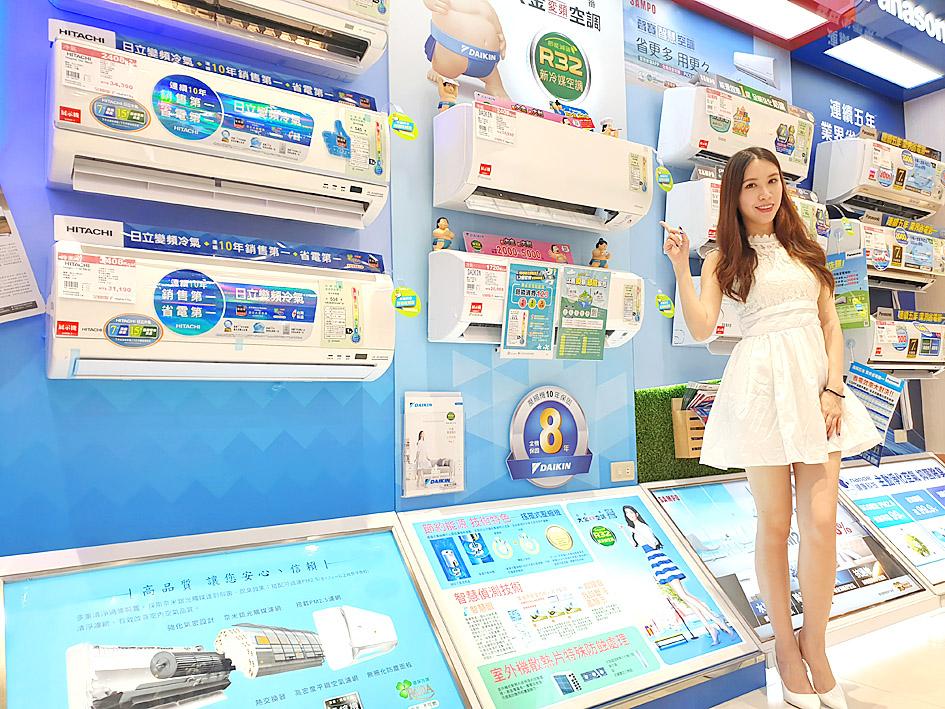A tax incentive package to encourage purchases of energy-efficient home appliances that is set to expire on June 14 would be extended by an additional two years, the Ministry of Finance (MOF) said yesterday.
The ministry has proposed a draft amendment to the Commodity Tax Act (貨物稅條例) that would extend the tax breaks on select energy-saving appliances until June 14, 2023.
Article 11-1 of the act stipulates that a commodity tax cut of up to NT$2,000 (US$70.58) would be given for purchases of new refrigerators, air conditioners or dehumidifiers that meet either Level 1 or 2 energy-saving standard specified under the Bureau of Energy’s energy-efficiency rating program from June 15, 2019, to June 14 this year.

Photo: Wu Pei-hua, Taipei Times
The incentive has contributed greatly to energy savings and carbon emissions reduction, while reducing electricity bills for consumers, the ministry said.
The draft amendment is subject to a 20-day public comment period starting yesterday, it added.
Ministry of Economic Affairs statistics showed that 10 years or older air conditioners and refrigerators account for 42.72 percent of those used in homes in Taiwan, prompting the finance ministry to propose extending the incentive.
As of the end of last year, 2.657 million applications for tax deductions had been filed, which translates into NT$4.47 billion in tax rebates, finance ministry statistics showed.

UNCERTAINTY: Innolux activated a stringent supply chain management mechanism, as it did during the COVID-19 pandemic, to ensure optimal inventory levels for customers Flat-panel display makers AUO Corp (友達) and Innolux Corp (群創) yesterday said that about 12 to 20 percent of their display business is at risk of potential US tariffs and that they would relocate production or shipment destinations to mitigate the levies’ effects. US tariffs would have a direct impact of US$200 million on AUO’s revenue, company chairman Paul Peng (彭雙浪) told reporters on the sidelines of the Touch Taiwan trade show in Taipei yesterday. That would make up about 12 percent of the company’s overall revenue. To cope with the tariff uncertainty, AUO plans to allocate its production to manufacturing facilities in

TAKING STOCK: A Taiwanese cookware firm in Vietnam urged customers to assess inventory or place orders early so shipments can reach the US while tariffs are paused Taiwanese businesses in Vietnam are exploring alternatives after the White House imposed a 46 percent import duty on Vietnamese goods, following US President Donald Trump’s announcement of “reciprocal” tariffs on the US’ trading partners. Lo Shih-liang (羅世良), chairman of Brico Industry Co (裕茂工業), a Taiwanese company that manufactures cast iron cookware and stove components in Vietnam, said that more than 40 percent of his business was tied to the US market, describing the constant US policy shifts as an emotional roller coaster. “I work during the day and stay up all night watching the news. I’ve been following US news until 3am

Taiwan will prioritize the development of silicon photonics by taking advantage of its strength in the semiconductor industry to build another shield to protect the local economy, National Development Council (NDC) Minister Paul Liu (劉鏡清) said yesterday. Speaking at a meeting of the legislature’s Economics Committee, Liu said Taiwan already has the artificial intelligence (AI) industry as a shield, after the semiconductor industry, to safeguard the country, and is looking at new unique fields to build more economic shields. While Taiwan will further strengthen its existing shields, over the longer term, the country is determined to focus on such potential segments as

COLLABORATION: Given Taiwan’s key position in global supply chains, the US firm is discussing strategies with local partners and clients to deal with global uncertainties Advanced Micro Devices Inc (AMD) yesterday said it is meeting with local ecosystem partners, including Taiwan Semiconductor Manufacturing Co (TSMC, 台積電), to discuss strategies, including long-term manufacturing, to navigate uncertainties such as US tariffs, as Taiwan occupies an important position in global supply chains. AMD chief executive officer Lisa Su (蘇姿丰) told reporters that Taiwan is an important part of the chip designer’s ecosystem and she is discussing with partners and customers in Taiwan to forge strong collaborations on different areas during this critical period. AMD has just become the first artificial-intelligence (AI) server chip customer of TSMC to utilize its advanced